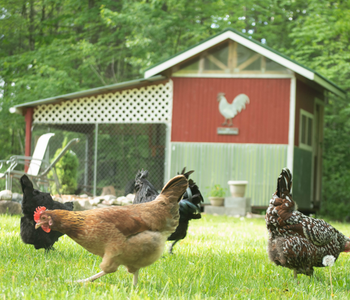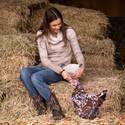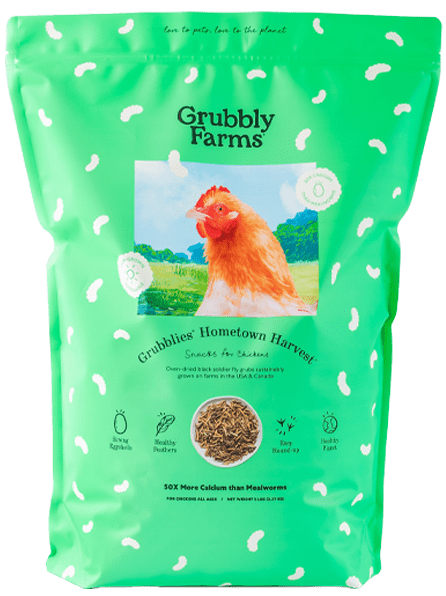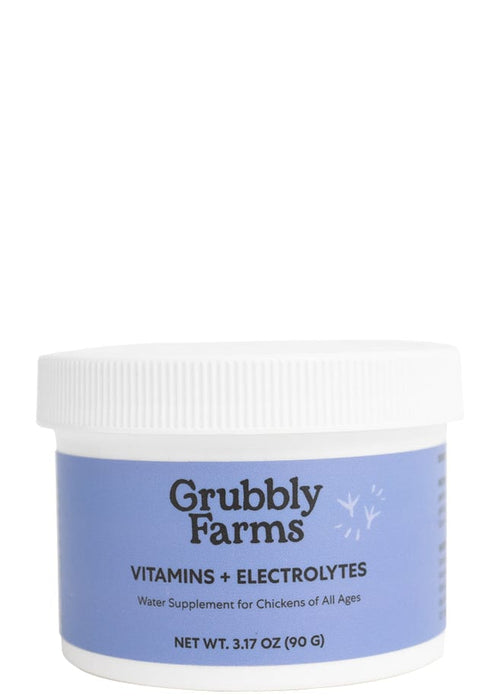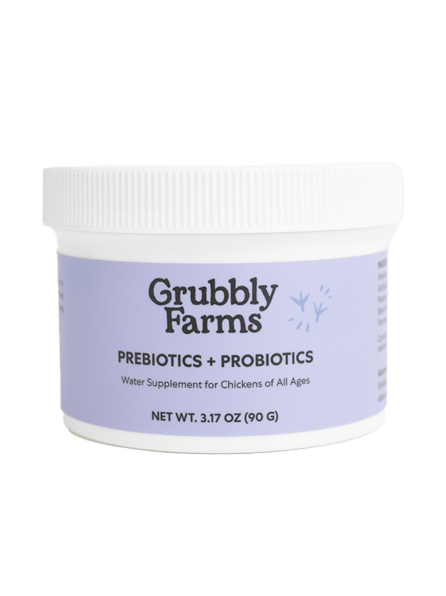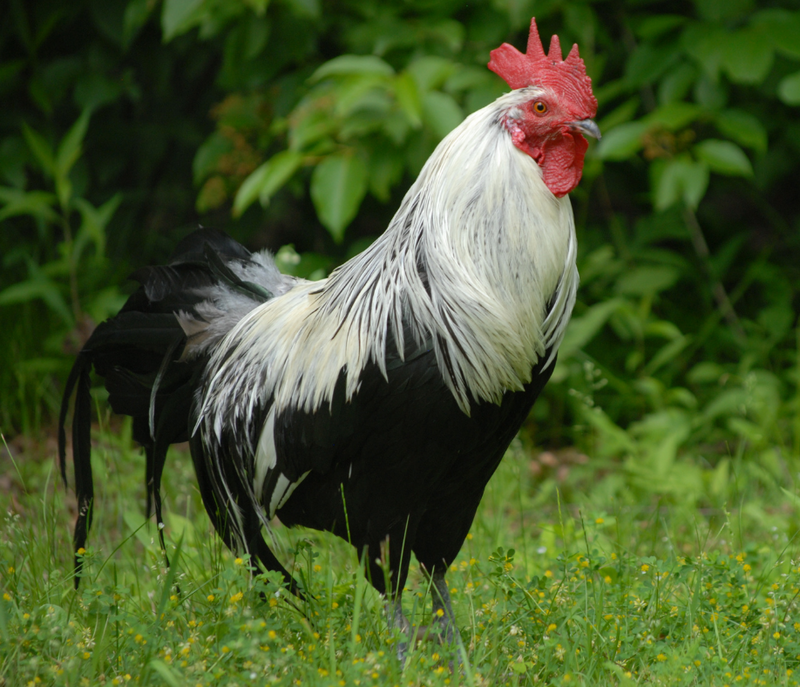Free-ranging is a natural instinct for chickens- they love to forage! Watching a flock of free-roaming chickens can be both entertaining and fulfilling. However, free-ranging does come with certain risks. If free-ranging your beloved flock sounds too risky, but you’d love for them to enjoy the freedom of roaming and naturally foraging, then these tips will help you find a happy medium. With these five tips, you can let your flock enjoy roaming free and keep them safe while they’re at it!

#1. Teach your flock to come when called
Teaching your flock to come when they are called is extremely helpful when free-ranging. When you give the signal, your flock will come running to you so that you can easily herd them back into their coop for safety or nightly roosting.
Training your flock to come when called is actually easier than it sounds! All you need is a very motivating treat (think Grubblies!) and a chosen marker signal. The marker signal should be a noise that is loud enough for your flock to hear no matter where they are free-ranging. Clapping your hands, whistling, shaking a bag, or ringing bells would all make good marker signals.
Start by associating the signal call with the highly motivating treats. While the chickens are in their enclosure or coop, do the marker signal and give them a handful of treats. If you do this every morning and evening for at least a week, your flock will start to associate that noise with yummy treats! Practice calling them out of their coop into the enclosure or from the enclosure back into the coop to further encourage them to come running when they hear the marker signal.
Next will come the big step of letting your flock out to free-range! Let them forage and roam for a little while before testing out the marker signal. They will want to enjoy their freedom for a little while before being called to come back to their coop. When it is time to call them in from free-ranging, make the marker signal and watch them come running! Make sure you make the signal loud enough for them to hear. Repeat the signal several times to further ensure your flock comes running. Give them their treats inside their enclosure or coop and close the door.
Yes, there will be stragglers the first couple of times! The more you make a habit of calling your flock in from free-ranging, the more they’ll understand the drill. Having a highly valued reward, like Grubblies, will help immensely by positively enforcing this new behavior.
Training your chickens to come when called while they are out free-ranging makes it easy to quickly pen your flock up when danger is near. It also becomes helpful when you have to put your flock in when you can’t supervise them or if the weather turns bad. Plus, it’s always fulfilling to see your flock come running whenever you call them- even if they are just coming for the healthy snacks!
#2. Coop train your flock
Aside from training your flock to come when called, coop training your flock is also helpful if you plan on letting them free-range. Coop training involves teaching your flock to return to their coop at dusk to roost. Chickens like to roost in high, protected areas. Sometimes your flock may think that trees or low bushes make a better roosting spot than their coop. Coop training your flock teaches them that the coop is both a good place to roost and a place that will keep them safe at night.
Coop training starts as soon as you move your chickens into their coop. They can hang out in the enclosure during the day, but they must go into the coop to roost at night. This might involve a nightly routine of tucking all your chickens into their coop every evening. Eventually your chickens will learn to go in on their own and you won’t have to encourage them at all! To speed things up, you can even encourage them to go into their coop at dusk by sprinkling a healthy evening snack (like Grubblies) in the coop.
Once your flock is consistently going inside to roost on their own, you can consider them coop trained. When you let them out to free-range, they should instinctually return to their coop at dusk to roost. You may have some rebels or stragglers at first, but a consistent reminder of where to roost at night should teach them to go to the coop and not stay out all night.
Keep in mind that your flock’s bedtime may be a little later when they are out free-ranging. Like kids who don’t want to leave a play date, your flock will want to get the most out of their free-range time! However, your flock will instinctually resort to their coop for safety before it gets too dark. If your flock is hesitant about returning their coop at night, use the ‘come when called’ trick to get them into their coop at dusk. Most chickens can’t resist a healthy bedtime snack!

#3. Get a rooster
Having a rooster with your flock can prove very helpful when you let them out to free-range. Roosters instinctually have two jobs; to mate with the hens and protect the flock. Having a good rooster with your flock can provide protection and an alarm system while your flock forages and free-ranges.
Specifically, a rooster will provide these benefits to a free-range flock:
- Alarm call- they will sound an alarm when danger is near
- Protection- some roosters will fight off an attacker to save the rest of the flock
- Keep the flock together- a rooster will try and keep all his hens together in one area so he can keep an eye on all of them at once
- Training- roosters can make coop training and come-when-called training more effective as they naturally lead the hens to safety and food
Adding a rooster to your free-range flock can provide an extra element of protection and can make free-ranging your flock less stressful!
#4. Designate a free-range area
While it may seem like you are defeating the purpose of free-ranging, you can designate a safe area for your flock to roam and forage in. It allows you to have some control over where they roam and provides a specific area that you can monitor and watch for the safety of your flock.
This will require a little extra work on your part. You will have to fence off a large area for your flock to roam, otherwise it’s just like an extended enclosure. Ideally there should be enough space that your flock doesn’t completely destroy all the vegetation in the area. You can even set up a rotational system where you rotate your flock through several different free-range areas to allow each area some recovery time in-between rotations. Having three to four pastures that you can rotate your flock through is healthiest for your flock and the environment.
How you fence off the designated area is up to you, but each option has pros and cons. Poultry netting is a cheap option, but not completely predator proof. Chicken wire, hardwire cloth, or galvanized fencing are a little more expensive but do provide a little more protection.
When choosing a designated area for your flock to free-range in, consider these elements:
- Plenty of space- so your flock won’t completely destroy the area
- Shade- there should be shade and sources of natural cover/protection from arial predators
- Shelter- ideally have a shelter from the elements in the free-range area
- Varied forage- it helps to have a variety of forage types in the designated area, such as pasture and leaf decay
- Water- make sure there is a source of fresh water for your free-ranging flock
Having a designated area for your flock to forage in helps you create a somewhat safer, more protected environment for your flock. It will require some time and investment, but the security of your flock is worth it!
#5. Supervise your free-range
If having a designated free-range area for your flock sounds too limiting, then you could opt to supervise your free-range. Supervised free-range can be as strict or as lax as you like. You can let your chickens out only when you are outside too, or maybe you let your chickens out if you are home.
Having a human presence around can help deter predators. If your flock sees you as one of their flock members, they may also be more apt to hang out around where you are. Being outside or present when your flock is free-ranging allows you to react immediately to any accidents or attacks that may occur during free-range time. Keep in mind that not all predators will be deterred by human presence! Predators can be very bold when they are hungry or just aren’t bothered by humans (think stray dogs).
Other household pets or farm animals can also help with supervised free-range time! Dogs that are used to being around chickens can be a huge help in deterring poultry predators. Donkeys, geese, and guinea fowl are also known to be very protective and can help deter predators.
You can also have a certain time of the day that you designate as free-range time. Maybe there are times that you know you are going to be home or working outside, those would be good times to allow your flock some freedom. Keep in mind that early morning and dusk are when predators are going to be the most active. However, that doesn’t mean midday attacks should be disregarded either! Predators are not picky as to when they have their chicken dinner!
Free-Range Safely!
A happy, healthy flock will enjoy following their foraging instincts while free-ranging. With a little preparation and precautions, you can help your flock find a healthy balance between safety and their newfound freedom!





